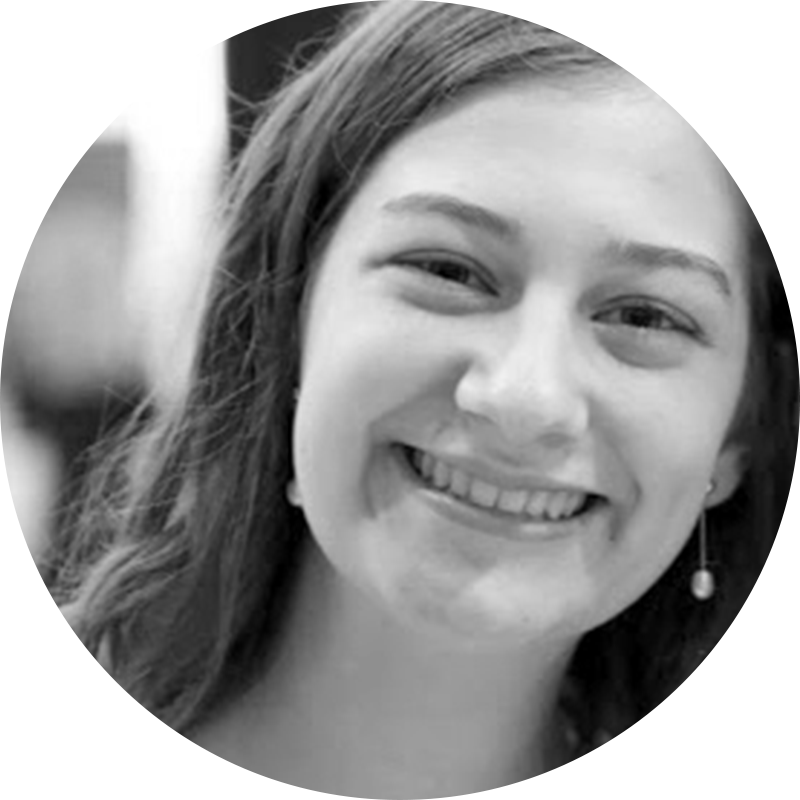Student Researchers
The Digital Humanities Initiative at Hamilton College is a humanities-based collaboratory supporting long-term faculty-led interdisciplinary research projects involving students.

Isabelle Crownhart
Isabelle Crownhart (Hamilton ‘23) majors in history and minors in government. Her current research is focused on tracing the emergence of the early modern pharmacopoeia and the origins and biases of early medical markets. Crownhart aims to clearly identify and delineate a story of the quest to define and categorize medical materials and explore how this story is relevant to the ensuing imperial criminalization of some such products alongside the exploitation of others. In the summer of 2022 Crownhart will help create a database of materia medica from the Ricettario Florentino and act in a capacity as student project manager.

Naima Akter
Naima Akter (Hamilton ’24) is a Biochemistry and Molecular Biology major. She has contributed to the creation and maintenance of the database of materia medica. Her main concentration lies in the exploration and subsequent comparison of natural products that have their origins in the fifteenth, sixteenth, and seventeenth centuries. By analyzing and researching journals published regarding natural product libraries and examining drugs in physical archives of early modern collections, such as in herbaria and the Giustiniani medicine chest, Akter charts these medicaments’ mechanisms of action, history, and how they appear in the pharmaceutical industry today.

Isabella Roselli
Isabella Roselli (Hamilton ‘23) is a History major with a minor in Medieval and Renaissance Studies. She currently is working on compiling a database and transcribing published apothecary logs from the late medieval and early modern period to be posted on the DALME (Documentary Archaeology of Late Medieval Europe) webpage, as well as transcription and translation of New World Nature materials. In the past, she has investigated the ways in which historians understand medieval gender, race, and class, and hopes to bring her work on intersectionality into the New World Nature project this summer.

Carter Myers-Brown
Carter Myers-Brown (Hamilton ‘23) majors in history and world politics, through which he explores different states/ cultures relationships with the environment. He manages the transcription and data collection of print and manuscript pharmacoepias collected for this project. With his work on the first civic pharmacopeia, the Ricettario Fiorentino, he grapples with questions about how to represent the changing uses and expenses of these medicines over the early modern period. More broadly, he considers medical markets across history to understand the relationship between supply, demand, and price in an increasingly connected world.

Liam Garcia-Quish
Liam Garcia-Quish (’23) plans on majoring in history and minoring in geosciences. He is particularly interested in the intersections between Renaissance and New World epistemologies of nature. He has mined roving Renaissance Florentine Francesco Carletti’s sixteenth-century travelogue written during his stints in Mexico and Peru to collect information on topics of gender relations and natural history. At present, he is translating sixteenth and seventeenth-century publications of Renaissance philosopher Tommaso Campanella as part of his research on the role of natural philosophy in the production of early modern knowledge.
Past Student Researchers

Antton De Arbeloa
Antton De Arbeloa (’21) majors in history with a minor in art. He has pursued his study of colonial Latin American history through research in Spanish archives in addition to the completion of the structured database of the sixteenth-century Relaciones Geográficas de Nueva España. His research on the relaciones and their intersections with imperial science was presented alongside Professor Mackenzie Cooley in Fall 2019 at the Max Planck Institute for the History of Science’s “Knowing An Empire: Imperial Science in Early Modern Chinese and Spanish Empires” conference in Berlin. He is currently working on his honors history senior thesis project: “Ohtli from Sea to Sea: A History of Aztec Pathways and Spanish Colonialism from Acapulco to Veracruz, 1500-1600.”

Thomas Anderson
Thomas Anderson (’20) double majored in history and French and francophone studies. His work focuses on island-based medicines and herbals, with a particular emphasis on poisons and their antidotes. Thomas recently completed a transcription and translation of Jean-Baptiste Ricord’s extensive Mémoire sur le Mancenillier vénéneux and has conducted archival research in the Canary Islands and France.

Elizabeth Atherton
Elizabeth Atherton (‘22) majors in history with minors in French and government. Her research has prioritized indigenous sources in the study of colonial Mesoamerica, primarily the Matricula de Huexotzinco and the Historia de Tlaxcala. She now hopes to apply her previous research on flora and fauna from the “Seeing New World Nature” Vikus Viewer Platform to the study of abortifacients in early modern Latin America.

Kate Biedermann
Kate Biedermann (’22) plans to double major in history and French. As a CLASS Fellow in the Digital Humanities, she is attending courses in the digital approaches at the DHSI to continue her research on the intersections of race and animality with Professor Mackenzie Cooley. At present, she is developing a multilingual database of race in European discourse from 1350 to 1800.

Philip Chivily
Philip Chivily (’23) majors in history and classical studies with a focus on Latin. His work focuses on the role of early modern Jesuit healers and scholars in combatting and studying pandemics and diseases. At present, Philip is translating pertinent passages of Anthanasius Kircher’s Scrutinium Physico-Medicum Contagiosae Luis, Quae Pestis Dicitur (A Physico-Medical Examination of the Contagious Pestilence That is Called the Plague) and Mundus Subterraneus (Subterranean World). He is also translating a collection of letters written by Kircher with the intention of compiling a mini critical edition.

Erica Ivins
Erica Ivins (‘21) majors in history and archaeology with a focus on colonialism and human rights. Her research has explored how indigeneity shaped early human rights debates in colonial Mesoamerica through her study of the encomienda system and the relaciones geográficas corpus. Erica also joined Stanford University’s Senegal Slave Liberations Project in 2020, analyzing and documenting 27,000 slave liberation records from 1857 to 1903. She will continue this research during the winter of 2021 to study how digital humanities projects on the history of enslavement and liberation can employ decolonizing methodology to shed light on the experiences of oppressed peoples. Erica’s previous archival work on Joseph Conrad and Heart of Darkness was recently awarded the 2020 Undergraduate Essay Prize from the North American Conference on British Studies.

Kayla Self
Kayla Self (’21) majors in World Politics in Latin America and the Caribbean. Kayla has contributed to the relaciones geográficas database and conducted on-site research in Puerto Rico and the Dominican Republic during the summer of 2019 to understand how the Spanish Caribbean served as a precedent for inland Iberian empire.

Emma Tomlins
Emma Tomlins (’23) majors in history with a double minor in French and literature. Emma’s current project traces the global Iberian medical market from 1500 to 1700, focusing on the circulation of New World materia medica through the Habsburg courts. In winter of 2021, she will develop a digital map and database that aim to emphasize indigenous medical markets and their connections to the global Iberian network.

Alexa (Ali) Zildjian
Alexa (Ali) Zildjian (‘19) graduated with a major in literature and minors in history and theater. Her academic interests land mostly in Medieval and Renaissance topics, which led to her employment as an Assistant Documentarian in the Burke Library’s Special Collections. She collaborated on the “Seeing New World Nature” Vikus Viewer Platform.

Edsel A.R. Llaurador
Edsel A. F. Llaurador (‘19) graduated with a major in history and a minor in public policy. He pursued his interest in the intersection of race, polity, and law through his research on the relationship between native knowledge and the Spanish Empire. He worked with Professor Mackenzie Cooley on a critical translation of sixteenth-century mestizo Diego Muñoz Camargo’s Historia de Tlaxcala.
